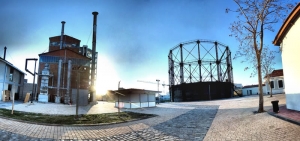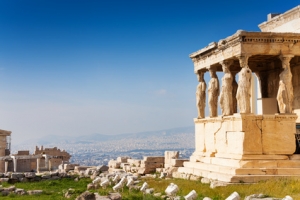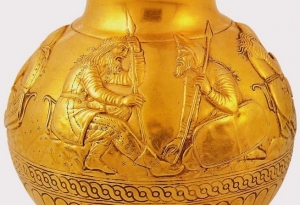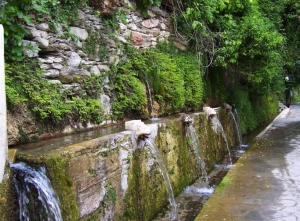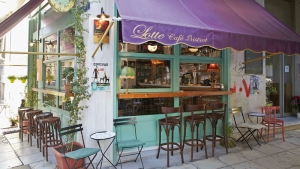LIFE & CULTURE
XpatAthens
Tuesday, 22 March 2016 07:00
Industrial Gas Museum At Technopolis In Athens
Technopolis is a well known venue for cultural shows, exhibitions and concerts in the Gazi area of Athens. It is also home to the Industrial Gas Museum. This museum gives fascinating insight into a short lived technological period. It helped transform Athens from pre-independence ramshackle village, to a modern city.
At the time in 1833, Athens certainly looked nothing like the city we see today. In fact, it was little more than a collection of ramshackle houses located in the Plaka area. At the time of independence from the Ottoman empire, the population was barely 5000. Hard to imagine when you see it today!
At the time in 1833, Athens certainly looked nothing like the city we see today. In fact, it was little more than a collection of ramshackle houses located in the Plaka area. At the time of independence from the Ottoman empire, the population was barely 5000. Hard to imagine when you see it today!
When King Otto took up residence in Athens, he (or his aides), embarked on a massive development plan for Athens. Grand neo-classical buildings were designed and built, parliaments organised, and industry encouraged. One of the modern developments, was the task of providing street lighting. From 1857 until around 1917, this was done solely with coal gas. It was gradually phased out as electric lights replaced gas street lighting. The coal gas was produced at the gasworks in Gazi, and employed thousands of people. The Industrial Gas Museum was created as a way to display the technologies of just 100 years ago, and demonstrate how things have changed.
To learn more about the museum, please visit: Daves Travel Pages
Industrial Gas Museum Athens
Website: http://www.technopolis-athens.com/web/guest/museum
Address: Peiraios 100, Athens, 11854
Published in
City Discovery
Tagged under
Tuesday, 22 March 2016 07:00
Tips To Help You Learn Greek
Learning a new language is not always easy - especially Greek! When you relocate to a country where you don’t speak the language, it is always a good idea to try and learn the language or at least a few words. Here are some tips to make learning Greek just a bit easier!
1. Learn the alphabet and listen to people speaking. It is important to learn how to pronounce the letters in the alphabet and once you know this, you will have no trouble being understood or pronouncing words.
2. Learn basic grammar. Many language teachers plunge into grammar without teaching the simple basics or teaching a single word. Many people will agree that it is best to initially learn a few of the basic rules such as the ‘to be’ rule and focus on learning words and phrases - grammar will come later.
3. Read road signs. Practice your language skills by reading road signs. It is a great way to familiarize yourself with your surroundings but also to help you remember and recognize letters of the alphabet.
4. Read subtitles. Many tv shows and films on Greek TV are in English with Greek subtitles. Reading the Greek subtitles while listening to the film in English is an excellent way to learn new words.
5. Listen to Greek music. Greece has many genres of music from traditional to modern, listening to Greek music while you work or just having it on while you're at home will help you pick up new phrases, not to mention enjoying great songs!
6. Talk with the locals. Not only is this a great way to integrate and meet people in your local community, but practicing speaking Greek is probably the greatest way to learn the lingo. Spending some of your day interacting with people you meet at shops, on the street or on the bus, will help you learn pronunciation, word order, grammar, and everyday phrases.
Learning Greek can be fun ~ enjoy!!
To read more tips, please visit: GreekReporter
1. Learn the alphabet and listen to people speaking. It is important to learn how to pronounce the letters in the alphabet and once you know this, you will have no trouble being understood or pronouncing words.
2. Learn basic grammar. Many language teachers plunge into grammar without teaching the simple basics or teaching a single word. Many people will agree that it is best to initially learn a few of the basic rules such as the ‘to be’ rule and focus on learning words and phrases - grammar will come later.
3. Read road signs. Practice your language skills by reading road signs. It is a great way to familiarize yourself with your surroundings but also to help you remember and recognize letters of the alphabet.
4. Read subtitles. Many tv shows and films on Greek TV are in English with Greek subtitles. Reading the Greek subtitles while listening to the film in English is an excellent way to learn new words.
5. Listen to Greek music. Greece has many genres of music from traditional to modern, listening to Greek music while you work or just having it on while you're at home will help you pick up new phrases, not to mention enjoying great songs!
6. Talk with the locals. Not only is this a great way to integrate and meet people in your local community, but practicing speaking Greek is probably the greatest way to learn the lingo. Spending some of your day interacting with people you meet at shops, on the street or on the bus, will help you learn pronunciation, word order, grammar, and everyday phrases.
Learning Greek can be fun ~ enjoy!!
To read more tips, please visit: GreekReporter
Published in
Greek Language & Culture
Tagged under
Monday, 21 March 2016 07:01
Greece To Go To Eurovision With Pontian Hip Hop
The Thessaloniki-based group Argo will represent Greece at the 2016 Eurovision Song Contest in Stockholm, Sweden from 10 to 14 May.
The song ‘Utopian Land’ includes Greek and English lyrics, incorporates the traditional Pontian lyra with contemporary rhythms and refers to the refugee crisis combining hip hop and folk music. ERT president Dionysis Tsaknis said that they wanted Greece to be represented by a song that will send a message to Europe about what the Greek people are facing now.
Source: Protothema
Source: Protothema
Published in
Greece In The News
Tagged under
Sunday, 20 March 2016 07:00
Business As Usual For Athens
Despite uncertainty in the outbound holiday market in Europe and the ongoing publicity of the refugee crisis, Athens has not lost ground as a leisure tourism and city break destination, according to the Athens Convention & Visitors Bureau (ACVB).
“It’s business as usual for Athens at ITB”, the convention bureau’s press officer, George Angelis, told the Greek Travel Pages (GTP) on the sidelines of the trade show in Berlin. “We have not seen or heard anything that should cause some concern. On the contrary, we see that there is currently a healthy demand for Athens, particularly in for city break and leisure tourism”, he said.
The Greek capital was represented once again at ITB (the world's leading travel trade show) which took place in Berlin from March 9-13, 2016.
To read more please visit: GreekTravelPages
To read more please visit: GreekTravelPages
Published in
Local News
Tagged under
Monday, 14 March 2016 09:37
Scythian Heralds From The Hermitage At Acropolis Museum
During the 2016 Greek-Russian initiative, dedicated to the promotion of Greece to the Russian public and of Russia to the Greek public, Athens and Moscow are planning a series of cultural events aiming at 'renewing the traditional bonds of friendship and enhancing awareness and cooperation,' as described in a statement made by the ministry.
As part of the exchange program, the Acropolis museum will exhibit three golden objects from the Hermitage Museum’s collection of Scythian treasures, while the Russian museum will exhibit a marble statue of an Archaic Kore, lent by the Acropolis Museum.
The Acropolis Museum will inaugurate the exchange on March 11, 2016 during a precursor exhibition presenting exhibits from the Hermitage Museum as part of the cultural program titled 'Year of Russia in Greece.'
Originally posted on: GreekReporter
Published in
Local News
Tagged under
Monday, 23 September 2019 07:00
Michelin-Starred Restaurants In Athens
The Michelin Guide has been in publication for over a century! The Michelin Guide is the oldest European hotel and restaurant reference guide, so a Michelin star (or stars) of excellence is something that only a few of the very best and notable establishments receive. Here are some of the exceptional restaurants in Athens that have been awarded by Michelin:
Hytra
Take the express lift up to the 6th floor of the striking Onassis Cultural Centre; here you'll find a sultry restaurant looking out over Syngrou. Classic Greek recipes are executed in a refined modern manner - for something a little different try the cocktail pairings. They also offer a bistro menu at the bar.
Take the express lift up to the 6th floor of the striking Onassis Cultural Centre; here you'll find a sultry restaurant looking out over Syngrou. Classic Greek recipes are executed in a refined modern manner - for something a little different try the cocktail pairings. They also offer a bistro menu at the bar.
Cuisine: Modern
Michelin Stars: One
Address: 6th Floor, Onassis Cultural Centre, 107-109 Syngrou Ave, 11745, Athens
Address: 6th Floor, Onassis Cultural Centre, 107-109 Syngrou Ave, 11745, Athens
Telephone: 210 3316 767
Price Point: $$$$
Dress Code: Smart
Spondi
A discreet, intimate restaurant with two delightful courtyards and two charming dining rooms - one built from reclaimed bricks in the style of a vaulted cellar. Top quality seasonal ingredients are used in imaginative, deftly executed, stunningly presented modern French dishes. Greek, French and Italian wines feature on an impressive list.
Cuisine: French
Michelin Stars: Two
Address: 5 Pyronos, Varnava Square, Pangrati, Athens
Telephone: 210 7564021
Price Point: $$$$
Dress Code: Smart
Varoulko Seaside
Varoulko sits in a great spot in Mikrolimano Marina - the chef's old neighbourhood. Watch the yachts glide by from the maritime-themed dining room which opens onto the water. Greek and Mediterranean dishes showcase organic vegetables, Cretan olive oil and the freshest seafood; squid and octopus feature highly.
Cuisine: Fish and seafood
Michelin Stars: One
Address: Akti Koumoundourou 52, Mikrolimano, Piraeus
Telephone: 210 5228400
Price Point: $$$$
Dress Code: Smart
Botrini's
A keenly run, ultra-modern restaurant away from the centre of the city; sit in the main room with its view of the chefs at work. Creative, characterful, flavour-packed dishes showcase the owner-chef's Greek-Italian heritage. He hails from Corfu and ingredients from the island are well used..
Cuisine: Mediterranean
Michelin Stars: One
Address: 24b Vasileos Georgiou, 10435, Chalandri
Telephone: 210 6857323
Price Point: $$$$
Dress Code: Smart
Published in
Restaurants In Athens
Tagged under
Sunday, 13 March 2016 22:26
The Best Bottled Water Is Greek
A new and relatively unknown company from Karditsa in northern Greece is claiming all the quality and taste awards at international water competitions.
Seven hundred waters from all over the world competed in the 26th annual Berkeley Springs International Water Tasting in West Virginia, and the first prize for the best bottled water category for 2016 was awarded to the natural mineral water 'Theony' from Karditsa.
According to Giannis Lelis, the General Manager of AHB Group — the company that bottles the water — 'Theony' is the most recent water that has made it in five international competitions.
To read more, visit: GreekReporter
To read more, visit: GreekReporter
Τo learn more about Theoni visit, http://www.theoni-water.gr/
Published in
Greece In The News
Tagged under
Saturday, 26 March 2016 22:08
The Best Spots For Food & Coffee In Koukaki
The hip central Athens district of Koukaki was recently voted among the top 10 must-visit up-and-coming global neighbourhoods, and for good reason! Not only is this area located just steps from the enchanting historic centre of Athens, it sits in the shadow of the magnificant Acropolis.
Koukaki has always been a popular neighbourhood in Athens, but recent additions to the area have made it that much more attractive to locals and visitors alike. Here are some of the area's best picks for food and coffee that will surely have you returning for more!
Koukaki has always been a popular neighbourhood in Athens, but recent additions to the area have made it that much more attractive to locals and visitors alike. Here are some of the area's best picks for food and coffee that will surely have you returning for more!
The Fabrica Of Euphrosinos
Address: An. Zini 34, 117 41
Price per person: € 20-25
Hours: Weekdays: 11.00-23.00, Friday-Saturday: 11.00-1.00
This new hot spot is a real food factory by George Gatsos who studied theology in Belgrade and passed through the kitchens of Mount Athos as a student. Gatsos' love for the authentic comes through in atmosphere and flavors. The decor is simple, by Serbian artist Gora, the food is delicious the wine selection unique from various small producers. The name of the restaurant is a dedication to Saint Euphrosinos, the patron saint of cooks. Euphrosinos is a busy spot so don't be suprised if it's full even if you visit mid week.
Hours: Weekdays: 11.00-23.00, Friday-Saturday: 11.00-1.00
This new hot spot is a real food factory by George Gatsos who studied theology in Belgrade and passed through the kitchens of Mount Athos as a student. Gatsos' love for the authentic comes through in atmosphere and flavors. The decor is simple, by Serbian artist Gora, the food is delicious the wine selection unique from various small producers. The name of the restaurant is a dedication to Saint Euphrosinos, the patron saint of cooks. Euphrosinos is a busy spot so don't be suprised if it's full even if you visit mid week.
Garyfallo-Kanella
Address: Zan Moreas 28 & Falirou 84, 117 41
Price per person: € 10
Hours: Weekdays: 11.00-18.00, Friday - Saturday until late.
In the kitchen at Garyfallo-Kanella you'll find Dimos and his mother. The menu consists of homemade traditional Greek mezedes dishes and the bread is also made in-house. On Fridays and Saturdays they're open late and serve traditional dishes from Asia Minor. Prices are great and they offer a delivery service within central Athens.
Address: Zan Moreas 28 & Falirou 84, 117 41
Price per person: € 10
Hours: Weekdays: 11.00-18.00, Friday - Saturday until late.
In the kitchen at Garyfallo-Kanella you'll find Dimos and his mother. The menu consists of homemade traditional Greek mezedes dishes and the bread is also made in-house. On Fridays and Saturdays they're open late and serve traditional dishes from Asia Minor. Prices are great and they offer a delivery service within central Athens.
ManiMani
Address: Makriyianni 10 & Falirou, 117 42
Price per person: € 22 - 25
Hours: Open daily and on weekends - closed on Sunday night.
This restaurant made Mani sausage with 'siglino' (celery) fashionable and with a 10 year history, its cuisine honors the traditions of its southern Greek origin. Fava, village hot dogs, giouvetsi (beef in tomato sauce) and pork with spinach all have an interesting twist from chef Alexandros Foroulis. It's location is perfect and offers a quiet oasis from the bustle of the city. Prices are at mid-range restaurant level and they also offer half portions at half the price too!
Address: Makriyianni 10 & Falirou, 117 42
Price per person: € 22 - 25
Hours: Open daily and on weekends - closed on Sunday night.
This restaurant made Mani sausage with 'siglino' (celery) fashionable and with a 10 year history, its cuisine honors the traditions of its southern Greek origin. Fava, village hot dogs, giouvetsi (beef in tomato sauce) and pork with spinach all have an interesting twist from chef Alexandros Foroulis. It's location is perfect and offers a quiet oasis from the bustle of the city. Prices are at mid-range restaurant level and they also offer half portions at half the price too!
Valparaiso
Address: G. Olympiou 7, 117 41
Price per person: € 10
Hours: Daily from 10.00-3.00
Located on the pedestrian walkway of Olympiou, this local gathers many people! Port Valparaiso in Chile was the inspiration for the name. The excellent design, great cocktails and amazing coffees of rare varieties all come together perfectly.
Address: G. Olympiou 7, 117 41
Price per person: € 10
Hours: Daily from 10.00-3.00
Located on the pedestrian walkway of Olympiou, this local gathers many people! Port Valparaiso in Chile was the inspiration for the name. The excellent design, great cocktails and amazing coffees of rare varieties all come together perfectly.
Pagaki
Address: Olympou 17, 117 41
Price per person: 10€
Hours: Daily from 11.00-00.00
Pagaki, meaning bench in English, is a collective-urban partnership where everyone works for everyone. The food options are few and excellent, including anchovies, beans, lemon flavored pork lemon and are all € 4 or less. Wi-fi is free and Pagaki is one of the few spots with excellent access for the disabled.
Lotte
Address: Tsami Karatasou 2, 117 42
Price per person: 10€
Hours: Daily from early in the morning
Lotte reminds you of a cfe that you'd find in Monmarte. It's small, vintage, and if you close your eyes you get the feeling that you're in mum's living room; the tiles are from the Municipal Theatre of Piraeus before it was remodelled. It's the perfect spot for a cup of tea and some hand made cakes!
Guarantee
Address: Veikou 41, 117 42
Price per person: 10€
Hours: Daily from 10.00-17.00
A gourmet sandwich spot that made sandwiches fashionable, Guarantee is celebrating 27 years of service. After this many years its inevitable to have a number of fans who love their famous cold cuts, roast beef and fluffy buns. Make a sandwich of your choice and combine it with a yummy fresh juice.
Originally posted in Greek on: AthensWiz
Published in
Restaurants In Athens
Tagged under
Monday, 24 February 2025 07:00
Kathara Deftera - Clean Monday In Greece
Clean Monday (or, in Greek, Kathara Deftera) is the first day of Great Lent in the Eastern Orthodox Christian Church. It is a feast that occurs at the beginning of the 7th week before Orthodox Easter Sunday.
Clean Monday also brings preceding Carnival celebrations to an end, inviting everyone to leave behind the'sinful' attitudes associated with Carnival festivities and non-fasting foods, which were largely consumed during the three weeks of the Carnival.
Date of Clean Monday in Greece This Year:
Monday, March 3
Clean Monday Traditions Around Greece
The feast day of Clean Monday is a public holiday in Greece and is celebrated with outdoor excursions, delicious fasting foods, as well as the widespread custom of flying kites.
The second most common tradition that takes place on Clean Monday in Greece is kite flying! Although nobody is quite sure where the kite-flying tradition came from - some say that the ancient Greek mathematician Archytas of Tarentum designed and flew the first kite to test aerodynamics, while others believe it started when people would write wishes on the kites and fly them as high as possible for the gods to answer - it is now such a firmly established tradition around Greece that the weather forecast for Clean Monday is closely followed in the preceding days.
The first and most common tradition of Clean Monday in Greece, of course, involves food! Although what is served on Clean Monday does depend on a family's or individual's favorites, below are some of the most popular traditional delights included at a Greek table on Clean Monday:
Lagana is a lightly unleavened flatbread made especially for and eaten only on Clean Monday.
Taramosalata, made from tarama (cod or carp roe), sometimes called 'the common man's caviar', is one of the tastiest and most famous of all Greek dips.
Octopus, shrimp, and kalamari—seafood is a signature dish on Clean Monday!
Halva is eaten as a dessert. There are various methods of making halva, but arguably the most common is made with tahini, a sesame paste, and sugar, often combined with nuts or chocolate and baked in a square.
Wine or tsipouro—because a traditional Greek meal is not complete without a glass of delicious wine or traditional tsipouro.
Published in
Greek Traditions
Tagged under
Thursday, 10 March 2016 07:00
Google To 'Grow Greek Tourism Online' In 2016
Google is aiming this year to educate over 30,000 Greek tourism professionals on the sales potential of the Internet through its ambitious Grow Greek Tourism Online initiative
In its third year, the Google training project, aims to boost the online presence of Greek tourism professionals and their businesses through ongoing training in the use of online technology and help attract visitors all year round.
In 2014 and 2015, over 10,000 Greek SMEs developed their digital skills through Google’s special seminars and online training sessions.
Google’s Grow Greek Tourism Online initiative runs in cooperation with the Tourism Ministry, the Greek National Tourism Organization (GNTO) and the Greek Tourism Confederation (SETE).
To read more and to learn how you can benefit, please visit: GreekTravelPages
To read more and to learn how you can benefit, please visit: GreekTravelPages
Published in
Greece In The News
Tagged under

